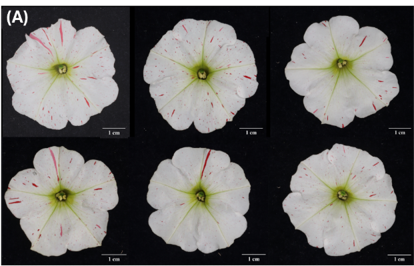Project Description:
What if you could watch the genome reshaping itself in real time—just by looking at flowers? In
Petunia hybrida W138, transposons leave visible red spots when they move, turning flowers into
living readouts of genome dynamics. This project will use this system to explore how biotic
stress, simulated through Salicylic Acid (SA) and Jasmonic Acid (JA) treatments, influences
transposon activity.
The W138 cultivar carries the dTph1 transposon in the ANTHOCYANIN1 (AN1) gene, disrupting
anthocyanin production, resulting in white flower petals. When dTph1 is excised, AN1 can be
restored in that cell lineage, resulting in the generation of red-pigmented spots. This provides
both a genetic and visual model to follow excision events under stress.
The project will involve:
- Using image-based methods to automate counting of pigment spots on petals
- Applying qPCR assays to quantify the proportion of genomic DNA with dTph1 insertion
- Refining image analysis to account for spot size and flower size
- Distinguishing between early and late excision events
- Applying SA and JA treatments to study stress-induced transposon dynamics
How to Apply:
Please send your CV and a brief statement of interest to j.gardiner@uu.nl with subject line "Student Application -
Transposon Dynamics".
Applications will be reviewed on a rolling basis until the position is filled.


